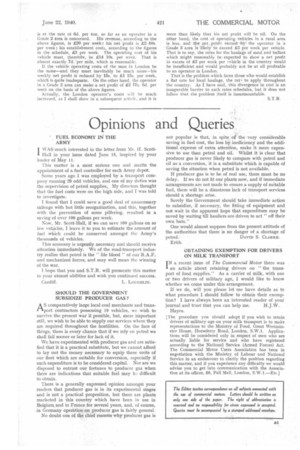Opinions and Queries
Page 27

If you've noticed an error in this article please click here to report it so we can fix it.
• FUEL ECONOMY IN THE ARMY WAS much interested in the letter from Mr. H. ScottI Hall in your issue dated June 15, inspired by your leader of May 11.
This matter is a most serious one and merits the appointment of a fuel controller for each Army depot.
Some years ago I was employed by a transport company running 20 odd vehicles, and one of my duties was the supervision of petrol supplies,, My directors thought that the fuel costs were on the high side, and I was told to investigate.
I found that I could save a good deal of unnecessary mileage with but little reorgaiiization, and this, together with the prevention of some pilfering, resulted in a saving of over 100 gallons per week.
Now, Mr. Scott-Hall, if we can save 100 gallons on so few vehicles, I leave it to you to estimate the amount of fuel which could be conserved amongst the Army's thousands of vehicles.
This economy is urgently necessary and should receive attention imrnediately. We of the road-transport industry realize that petrol is the " life blood " of our R.A.F. and mechanized forces, and may well mean the winning of the war.
I hope that you and S.T.R. will prosecute this matter to your utmost abilities and wish you continued success.
Cardiff. L. Lononena.
SHOULD THE GOVERNMENT SUBSIDIZE PRODUCER GAS?
AS comparatively large local coal merchants and transport contractors possessing 19 vehicles, we wish to survive the present war if possible, but, more important still, we wish to be able to supply our services where they are required throughout the hostilities. On the face of things, there is every chance that if we rely on petrol we shall fail sooner or later for lack of it.
We have experimented with producer gas and are satisfied that it is a practical substitute, but we cannot afford to lay out the money necessary to equip those units of our fleet Which are suitable for conversion, especially if such expenditure is to be considered capital. Nor are we disposed to entrust our fortunes to producer gas when there are indications that suitable fuel may b difficult to obtain.
There is a generally expressed opinion amongst your readers that producer gas is in its experimental stages and is not a practical proposition, but there are plants marketed in this country which have been in use in Belgium, and in France for several years, and, of course, -in Germany operation on producer gas is fairly general. No doubt one of the chief reasons why producer gas is not popular is that, in spite of the very considerable saving in fuel cost, the loss by inefficiency and the additional expense of extra attention, make it more expensive to use than petrol and oil. Whilst it is clear that producer gas is never likely to compare with petrol and oil as a conversion, it is a substitute which is capable of saving the situation when petrol is not available.
If producer gas is to be of real use, there must be no delay. If we do not fit our plants now, and if immediate arrangements are not Made to ensure a supply of suitable fuel, there will be a disastrous lack of transport services should a shortage arise.
Surely the Government should take immediate action to subsidize, if necessary, the fitting of equipment and not wait in the apparent hope that expenditure may be saved by waiting till hauliers are driven to act " off their own bats."
One would almost suppose from the present attitude of the authorities that there is no danger of a shortage of
petrol. DAVID S. CLARKE. Erith.
OBTAINING EXEMPTION FOR DRIVERS ON MILK TRANTSPORT
I N a recent issue of The Commercial Motor there was an article about retaining drivers on "the transport of food supplies." As a carrier of milk, with one or two drivers of military age, I would like to know whether we come under this arrangement.
If we do, will you please let me have details as to what procedure I should follow to obtain their exemption? I have always been an interested reader of your journal and trust that you can help me. J.W.
Hayes.
[The procedure you should adopt if you wish to retain drivers of military age on your milk transport is to make representations to the Ministry of Food, Great Westminster House, Horseferry Road, London, S.W.1. Applications will be considered only in respect of men who are actually liable for service and who have registered according to the National Service (Armed Forces) Act. The Commercial Motor Users Association has been in negotiation with the Ministry of Labour and National Service in an endeavour to clarify the position regarding this matter, and if you experience any difficulty we would advise you to get into communication with the Association at its offices, 50, Pali Mall, London, &W.f.—ED.]




























































